The Top 7 historically inaccurate historical games
Wait, that's not how it happened!
History and videogames have been intertwined since at least the early ‘80s, but at best it’s been a shaky relationship. Until fairly recently, concepts like “realism” and “accuracy” weren’t often a consideration, and they tended to be thrown out the window if a cool explosion or giant monster was judged more beneficial to gameplay. As technology has progressed, however, more of these games have been trying hard to be true to their historical roots – and, predictably, a lot of them don’t do so well.
For the sake of conciseness, we’re not going to pick on games that take creative license to the point of being obviously inaccurate or fantastical – so Genji: Days of the Blade’s giant crabs and demon-powered villains are out, as are clear alternate histories, like those in Resistance: Fall of Man, Turning Point: Fall of Liberty and any game that guessed at the future (i.e. Street Fighter 2010) and got it wrong.
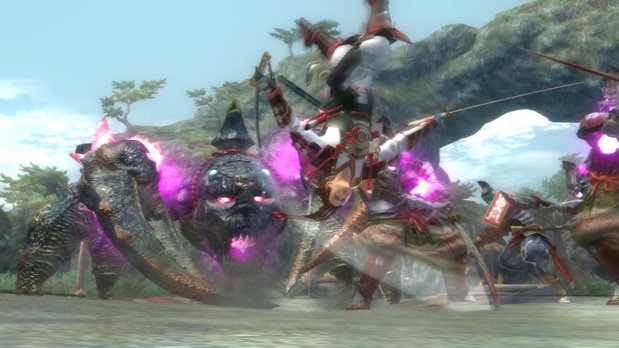
Above: Anything this stupid gets a pass, just because no reasonable person actually thinks giant enemy crabs roamed historical Japanese battlefields
No, these are games that either tried to get it right and failed, or quietly bent the truth just enough to serve their own (and, more often than not, the players’) ends.
7. Assassin’s Creed
Assassin’s Creed is a series that generally tries to accurately re-create history (or at the very least, to make it relatable and believable), but still manages to take flak for things like inaccurate costumes or architecture, characters that are substitutions or amalgams of real people, and portrayals of historical figures that are more villainous than they maybe deserve. But there’s one sticking point in particular that we want address, and it has to do with the Assassins themselves. Specifically, the game’s depiction of Assassins might lead some to believe that they were a sect of altruistic philosopher-superninjas – and the truth, while clouded by centuries of widespread misconceptions and untrustworthy stories, is a bit less glamorous.
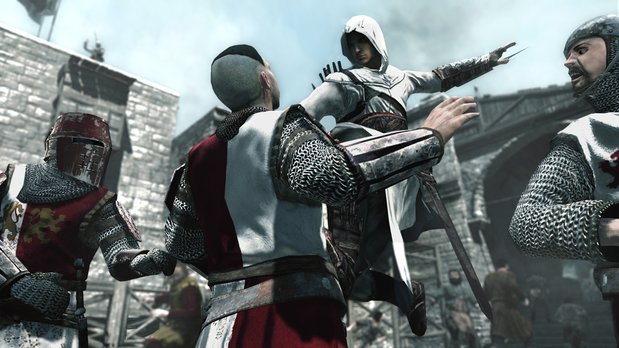
In reality, the Assassins had a bit more in common with suicide bombers, only without the indiscriminate killing. More properly known as the Nizari Ismailis, a Shiite Islamic sect that operated mainly out of a series of fortresses (including Assassin’s Creed’s Masyaf), the Assassins mainly targeted Sunni Muslim leaders that they saw as threats. While they had armies of their own, their most infamous tools were the fedayeen (or “those who sacrifice”), young men who’d been trained to use disguises, trickery and mastery of different languages and customs to get close to their targets. Once they’d achieved that, they’d strike with a dagger or knife in the most public and visible place possible – and then, as a rule, would make no attempt to escape, having been promised a place in Paradise on the completion of their mission.
That’s it. No Hidden Blades. No fancy hooded robes. No atheistic humanism (the “Nothing is true, everything is permitted” motto was actually a secret revelation reserved for the very highest levels of Ismaili initiates). And most importantly, no daring escapes across rooftops. Real Assassins (rumors of drug use and youths tricked with secret gardens notwithstanding) were patient, methodical spies who planned for their own deaths on the completion of a mission, and who saw that mission and subsequent death as the greatest religious sacrament they could undertake. But then, a game whose main characters are killed horribly and replaced after each successful murder probably wouldn’t be quite as much fun.
Sign up to the GamesRadar+ Newsletter
Weekly digests, tales from the communities you love, and more
6. Medal of Honor: Underground
Medal of Honor is another series that generally tries to re-create history, insofar as the technical limitations of game consoles will allow. Unfortunately, it doesn't always get it right – and it seems its efforts were kind of doomed from the start, because as early as the second game, it was already going off the rails.
In Underground, players take on the role of Manon Batiste, a female French Resistance fighter recruited as a commando by the US Office of Strategic Services. There’s a real-world analogue for her, one Helene Deschamps Adams, although her work for the OSS seems to have involved posing as a secretary for the Vichy puppet government, and scouting behind enemy lines. But hey, we’re not going to complain about a woman gunning down scores of Nazi troops, even if it’s stretching the truth. Hey, it could have happened, right?
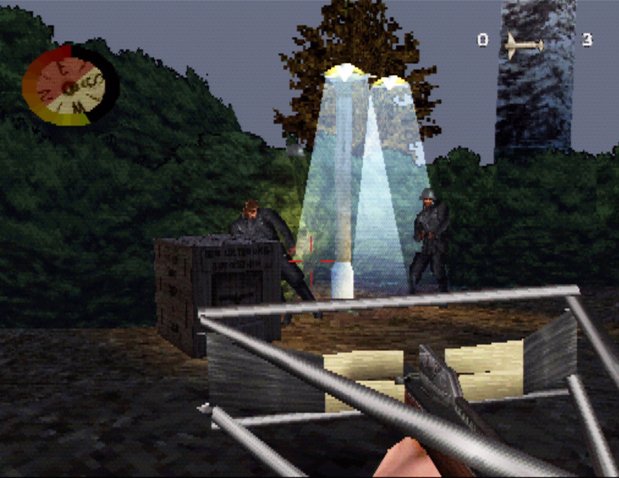
Above: That Big Joe crossbow, meanwhile, is actually a real thing
What we are going to complain about is the game’s fourth mission, Dark Camelot, in which Manon sneaks into Wewelsburg Castle to find a dark secret. Wewelsburg, incidentally, is better known as the headquarters of the SS and the inspiration for Castle Wolfenstein, so the idea of sending a lone female commando into such an obvious viper’s nest is a little insane. But it gets more insane when the game – which has been relatively faithful to history up to this point – pits you against Heinrich Himmler’s SS “knights,” who attack with frigging swords, while wearing bullet-resistant medieval armor.
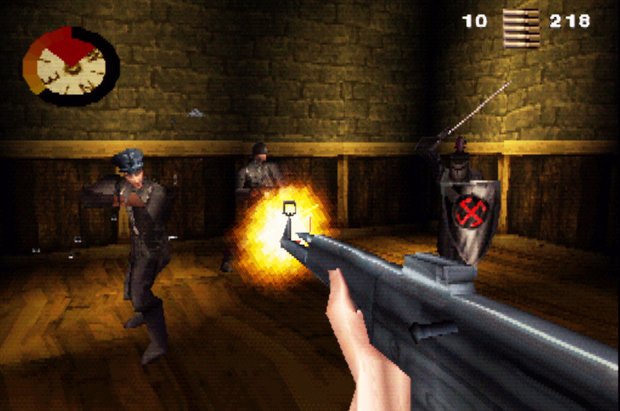
Above: One of these things is not like the other...
For the record, real bullets will go right the hell through medieval suits of armor, and they’ll go through them even harder when they’re fired from a 1940s-era submachine gun. That’s why nobody actually wears medieval armor into combat anymore. For a game so focused on realism (inasmuch as it was achievable on the PSOne), battling literal Nazi knights was a weird turn of events, even for a level set in what’s arguably the global center of cultish Nazi weirdness.
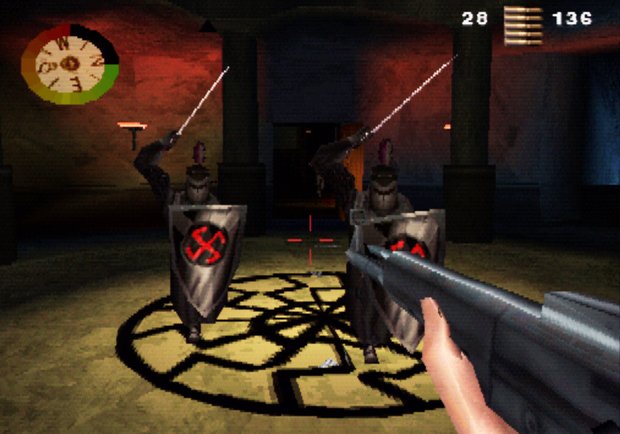
Above: And this would be the center of that center



